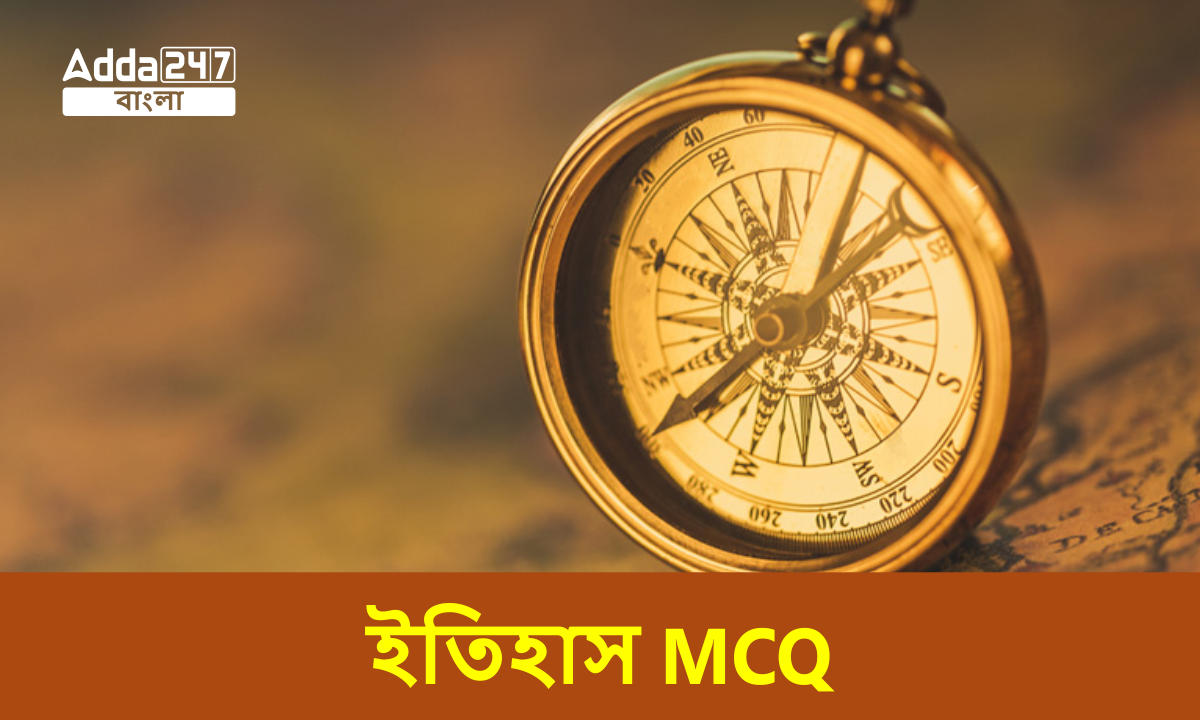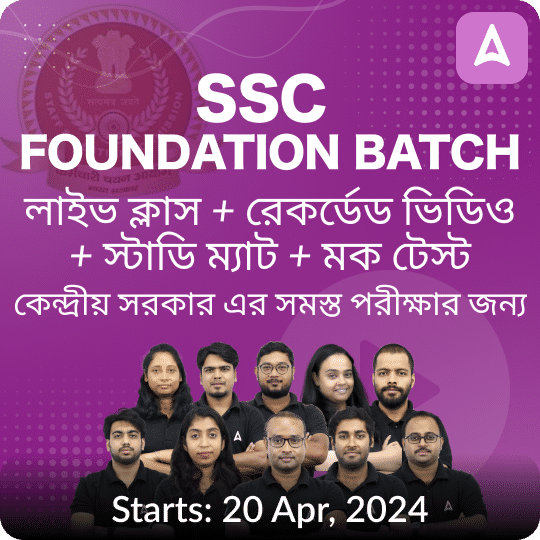ইতিহাস MCQ: Adda 247-এ আপনাকে স্বাগতম। ADDA 247 বাংলা আপনাকে WBCS, WBSSC, WBP, WBPSC, RAIL,SSC এবং BANK সহ সমস্ত প্রতিযোগিতামূলক পরীক্ষার জন্য বাংলায় ইতিহাস MCQ দিচ্ছে। এখানে আপনি প্রতিদিন সমাধান সহ একাধিক পছন্দের প্রশ্ন এবং উত্তর পাবেন। এখানে আপনি সমস্ত গুরুত্বপূর্ণ প্রশ্ন এবং উত্তর পাবেন যা আপনাকে আপনার জ্ঞান বাড়াতে এবং আপনাকে আপনার লক্ষ্য পূরণের দিকে এগিয়ে যেতে সাহায্য করবে। এই ইতিহাস MCQ নিয়মিত পড়ুন এবং পরীক্ষায় সফল হন।
| ইতিহাস MCQ | |
| বিষয় | ইতিহাস MCQ |
| বিভাগ | Daily Quiz |
| উদ্দেশ্য | WBCS পরীক্ষা |
ইতিহাস MCQ
Q1. নিম্নলিখিত সুলতানদের মধ্যে কাকে কাজী মুগিসুদ্দিন শরীয়তের আইন অনুযায়ী কাজ করার পরামর্শ দিয়েছিলেন কিন্তু সুলতান তার পরামর্শ প্রত্যাখ্যান করেছিলেন?
(a) আলাউদ্দিন খিলজি
(b) জালালউদ্দিন খিলজি
(c) মুহাম্মদ বিন তুঘলক
(d) ফিরোজ শাহ তুঘলক
Q2. অষ্টাধ্যায়ী রচনা করেছিলেন:
(a) পাণিনি
(b) কাত্যায়ন
(c) বেদব্যাস
(d) শুকদেব
Q3. নিচের কোন উপনিষদটি প্রাচীনতম?
(a) ছান্দোগ্য উপনিষদ
(b) মুণ্ডকোপনিষাদ
(c) বৃহদারণ্যক উপনিষদ
(d) তৈতারীয় উপনিষদ
Q4. সুগন্ধাদেবী, যিনি উপবিষ্ট লক্ষ্মীর চিত্র সহ মুদ্রার প্রচলন করেছিলেন, তিনি ছিলেন ——— এর রাণী ছিলেন।
(a) কর্ণাটক
(b) কাশ্মীর
(c) উড়িষ্যা
(d) সৌরাষ্ট্র
Q5. নবম শতাব্দীতে বিখ্যাত বিক্রমশীলা বিশ্ববিদ্যালয় কে প্রতিষ্ঠা করেন?
(a) সামন্তসেন
(b) বল্লালসেন
(c) ধর্মপাল
(d) গোপাল
Q6. কাকে কাশ্মীরের আকবর বলা হত?
(a) শিহাবুদ্দিন
(b) সুলতান সিকান্দার
(c) হোসেন শাহ
(d) জয়নাল আবেদীন
Q7. ——–এর উন্নয়নে আমির খসরো অগ্রণী ভূমিকা পালন করেন।
(a) খারি বলি
(b) আওয়াধি
(c) ভোজপুরি
(d) মৈথিলী
Q8. দিল্লীর কোন সুলতান লাখ বখশ নামে পরিচিত ছিলেন?
(a) কুতুবউদ্দিন আইবক
(b) বলবন
(c) আলাউদ্দিন খিলজি
(d) জালালউদ্দিন খিলজি
Q9. জয়ন-উল-আবেদীন, যিনি গো হত্যা নিষিদ্ধ করেছিলেন, তিনি ছিলেন ——–এর শাসক।
(a) বাংলা
(b) গুজরাট
(c) মালওয়া
(d) কাশ্মীর
Q10. ‘ভারতীয় জাতীয় কংগ্রেস’ নামটি দিয়েছিলেন-
(a) S.N. ব্যানার্জি
(b) ফিরোজ শাহ মেহতা
(c) দাদাভাই নওরোজি
(d) M.G. রানাডে
ইতিহাস MCQ সমাধান
S1.Ans.(a)
Sol. Alauddin Khilji was advised by Qazi Mughisuddin to act according to the laws of shariat, but the Sultan rejected his advice.
S2.Ans.(a)
Sol. Ashtadhyayi is a Sanskrit treatise on grammar written in the 6th to 5th century BC by the Indian grammarian Panini. This is one of the earliest known grammars of Sanskrit language. Katyayana of 3rd C. BC was a Sanskrit gramarian, mathematician and Vedic priest. The Brahma Sutras, also known as the Vedanta-Sutras is believed to have been written by Vayasa along with Badarayana.
S3.Ans.(c)
Sol. BrihdaranyakUpnishad is a pre Buddhist text of the period of 9th Century BCE to 6th Century BCE. The period of ChhandogyaUpnishad is uncertain, but according to some historian it lies between 8th Century BCE to 6th Century BCE.
S4.Ans.(b)
Sol. Sugandhadevi, who issued coins with the figure of seated Lakshmi, was a Queen of Kashmir.
S5.Ans. (c)
Sol. Vikramshila was founded by Pala king, Dharmapala in the late 8th or early 9th century. It prospered for about four centuries before it was destroyed by Bakhtiyar Khilji along with the other major centres of Buddhism in India around 1193 AD.
S6.Ans.(d)
Sol. Zainul Abidin may be regarded as the Akbar of Kashmir. He lacked the Mughul’s natural genius, spirit of enterprise, and physical vigour, and his outlook was restricted to the comparatively narrow limits of his kingdom, but he possessed a stock of learning and accomplishments from which Akbar’s youthful indolence had, to a great extent, excluded him, his views were more enlightened than the emperor’s, and he practised a tolerance which Akbar only preached, and found it possible to restrain, without persecution, the bigotry of Muslim zealots.
S7.Ans.(a)
Sol. Amir Khusrow played a pioneer role in the development of Khari Boli.
S8.Ans.(a)
Sol. QutubuddinAibak, Sultan of Delhi, was known as Lakh Baksh. He was called Lakh Baksh because he was generous and donated large sums of money as donations.
S9.Ans.(d)
Sol. Zain-ul-Abidin, who prohibited cow-slaughter, was a ruler of Kashmir. Zain-ul-Abidin was very tolerant towards the Hindus and took into his service such men that deserved his patronage and recognition of merit. The Sultan remitted the Jaziya Poll Tax, banned the killing of cows and granted Jagirs to Hindus. He celebrated Hindu festivals and visited their Tirthas with great reverence.
S10. Ans.(c)
Sol. The name ‘Indian National Congress’ was given by DadabhaiNaoroji, an influential Indian political leader and one of the founding members of the Congress. The Indian National Congress was established in 1885.The first session of the Indian National Congress was held in December 1885 in Bombay (now Mumbai).









